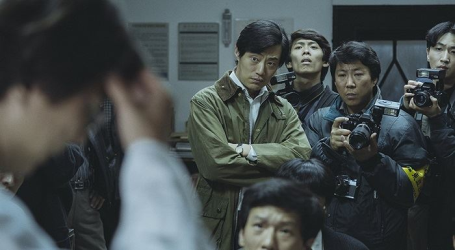It was Korean double-feature time—which comes when The Flower wants to visit her friends near Koreatown and the theater is playing two Korean movies at appropriate times. Watching Korean movies in this context came about earlier last year when I hung out in the city and watched Warriors of the Dawn rather than try to make the trip out and back twice.
The double-feature I saw (A Special Lady and A Blackened Heart) fired The Boy’s moviegoing juices and he decided to accompany me this time. Among those I’ve seen, this was the hardest of the Korean movies to watch, because it’s a fictionalization of an actual series of events (remember when there was all that trouble in Korea?) so there are a lot of threads to keep track of.

People watching us try to keep track of all the threads.
The story begins when a doctor is called in to resuscitate a student but cannot. It’s clear that this student had some rough times prior to his heart failure, and quickly clear that those rough times were visited on him by the thuggish cops who are demanding he be resuscitated. It turns out these are members of the anti-communist task force (ACTF, I’ll call them) that is charged with “eradicating communism”.
The ACTF figures, no problem, we’ll just cremate the body before morning and claim he slipped in the shower. The problem comes when they go to get their rubber stamp from the prosecutor (Jung Woo-Ha, The Handmaiden, Along with the Gods: The Two Worlds) and he realizes how hinky this all is and blocks them. (Nicely portrayed as a sense of ego at least as much as any desire for justice.)
He muscles his way into an investigation using—get this—Newsweek as a threat. It’s hard to imagine today that Newsweek was ever a thing, but they carried some clout for decades. (Not that they weren’t always hacks: In 1959 they had nothing to say about Castro except that he was honest and certainly not a Communist.) This ultimately gets him fired, but on the way out he just happens to leave a box of files by his car where an intrepid reported grabs the autopsy report for the dead student.

Sold for a dollar? And busted for money laundering?
At this time, newspapers were only allowed to print what the government allowed, so there’s a real edge to a newspaper printing this story—unlike the legalistic wrangling so ridiculously overblown in American movies (hello, The Post), there was a real physical and existential threat to printing something the government didn’t approve of in the ’80s in Korea.
Meanwhile, apolitical college student (Tae-Ri Kim, who was the eponymous The Handmaiden, and who was only 15-years-old at the time, making that movie child pornography by current US law) is resisting her uncle’s constant attempts to use her as a courier to a revolutionary, only to find herself strongly attracted to a protesting student. She finds herself increasingly drawn into events and is, in a lot of ways, the most likable character.

Her uncle bribes her with a walkman. Look at that sleek personal entertainment device!
There’s a lot going on here. The thugs that make up the ACTF remind me of nothing so much as The Green Wave Iranian Revolutionary Guards, only—since it’s the ’80s—their “uniform” is basically denim, like the streets are being patrolled by angry Asian Footloose-Era Kevin Bacons, but I suspect that aspect of the story rings the truest. Thugs, after all, are thugs, regardless of who signs their checks.
Inspector Park (Yun Seok-Kim, The Fortress, which I did not get down to Koreatown to see, alas) heads the ACTF, and he is as ruthless an S.O.B. as you’d ever want to see. He was apparently a refugee from North Korea and the movie explains his zealousness both as an element of his patriotism (for South Korea) and, briefly, toward the end, the result of seeing the horrors of Communism in his youth.
The movie could’ve used more of that, frankly. Even with exaggerations, I feel like the basic representation of the ACTF was probably pretty close: Any secret group of intelligence agents operating above scrutiny is going to end up this way (*kaff*) or even start out that way (*kaff*kaff*kaff*haaacck*).

This is a warrant for your hacky “cough” jokes.
But the beauty of it being a foreign country’s issues is that: a) They’re going to handle these kinds of questions differently from the way we do; b) You’re not awash in the conventional wisdom, so you don’t have to roll your eyes at all the stupid things “everyone knows”. I liked it quite a bit; the Boy liked it, too, despite having trouble following it in parts. I thought it did a really good job at making the story follow-able by having clear threads that were distinct (the girl, the prosecutor, the Inspector, the jail warden, etc.) but tied together in a way that allowed you to get oriented to how everything related, and who was who.
Although there isn’t the typical ’80s music (for an American movie, it could well be typical for Korean films), it was fun to see the clothing and electronics of the era. (They were about five years behind us back then.) There’s a lot of shenanigans with what we now call land lines, including a great brutalization of an old-school phone, with the prosecutor hammering the receiver down. (Try that with your cell phone, kids! No, seriously! Try it! Then go eat a Tide Pod!)
Check it out, kimchee fans!

Also, once again, we see that the Koreans do not mourn their dead quietly.

2 thoughts on “1987: When The Day Comes”